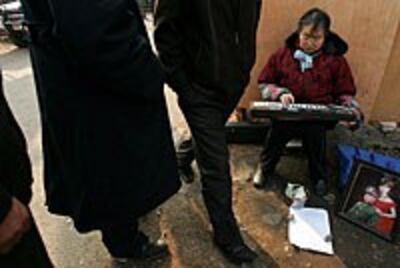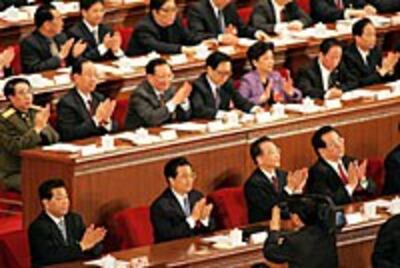
HONG KONG—Life is returning to normal in the Chinese capital following nine-and-a-half days of carefully choreographed leadership speeches, news conferences, and votes that made up this year's session of the National People's Congress (NPC).
But for thousands of ordinary Chinese caught between rampant official corruption and breakneck economic growth, business as usual means a seemingly endless cycle of complaints forms, bureaucracy, queues and attempts to win redress. Often, this leads to despair.
Suicide bid on Tiananmen Square
Yang Jie, a 40-year-old woman from the southern boomtown of Shenzhen, told RFA's Mandarin service that she arrived on Tiananmen Square last Sunday with a bottle of methylated spirit, fully intending to commit suicide by setting herself alight.
Eyewitnesses said Yang's attempt, made around 9 a.m. just outside the Mao Zedong mausoleum, was quickly thwarted, and that she was taken away by police. Contacted by RFA's Mandarin service, Yang confirmed the story:
"They took me to the Tiananmen branch police station. They didn't let me out again until around 9 in the evening," Yang, 40, said.

"I was carrying methylated spirit, and they confiscated that from me... They kept talking about sorting out my problems, sorting out my problems, but in the end nothing got sorted out," she said.
In 2003, Yang donated a quarter of her liver to save her husband's life at the No. 2 People's Hospital in Shenzhen.
But her husband died on the operating table, and Yang suspected it was because her organ had been given to another person. But the hospital wouldn't give up his body for examination, and Yang couldn't prove her allegations.
"The Constitution, the Courts, the Central Committee for Discipline Inspection, the All China Women's Federation, the All China Federation of Trade Unions, I've been to them all," she told RFA. "What else am I supposed to do?"
Desperate times for many
Yang's was not the only suicide attempt in the last days of an NPC, which pledged to fight graft at every level and build a harmonious society using people-centered policies.
A resident of a petitioner squatter village in the southern district of Fengtai told RFA that a man from Henan had jumped off a bridge in a suicide attempt and had been saved by emergency services. It was unclear what had happened to him after that.
"There was a man yesterday, a petitioner, who jumped off the Jishui bridge. They said he was from Henan..."
She said that even though the raids on petitioner village had ceased with the ending of the National People's Congress (NPC) on Monday, many petitioners were left in such a state of despair that they could only seek a final way out of their situation.
"There's nothing they can do," said the woman, identified only by her surname, Bai. "They haven't found a solution to their problems here."
"As for their living conditions, you haven't seen it with your own eyes. In the daytime they go around picking up discarded food, then they buy a few noodles, or two steamed buns. They live crammed in together, 10 or 20 people in rooms of about 15 square feet, so you can imagine the filth," she said.
So far, the authorities have succeeded in quashing any attempts at organization among the tens of thousands of petitioners who descend on the capital around the time of major political meetings like the NPC and the Party Congress last August.
But Liu Jie, a petitioner from Heilongjiang, said he had managed to gather a petition of 700 signatures, and give it to the NPC during its recent session. He spoke to RFA's Mandarin service on Tuesday:
"The NPC has a mandate to carry out investigation and consultation. As citizens we have the right to provide consultation to the NPC. We petitioners submitted a consultation document on the judicial system, asking for investigations to be carried out."
Liu said the petitioners had asked for investigations into their treatment, mostly at the hands of China's judiciary.
"The rights of citizens have not been protected in the legally conducted court cases brought by petitioners, in fact they were violated," Liu told RFA.
Appeal to parliamentarians
"In the course of their lawsuits, many of them have been asked for bribes, or been detained, beaten up, forced into mental hospitals, locked up in jail or sent for re-education through labor."
"According to the 41st and the 5th articles of the Constitution, we have applied to the NPC for it to carry out investigations into these cases," Liu said.
Liu was detained last Friday by officials from his hometown in the northeastern province of Heilongjiang and detained in the provincial representative office in Beijing.
While there, he told RFA that his local officials had promised to help with his case, and were going to take him home late Tuesday.
Meanwhile, a petitioner surnamed Chen on Tuesday expressed concern over the fate of fellow petitioner from the northwestern region of Xinjiang, Li Xiaocheng,
Li was one of the organizers of a demonstration planned and legally applied for by petitioners hoping to march to the Party Congress last August.
The march fell apart after key organizers were detained and security tightened in the streets of the capital. Activist Ye Guozhu was sentenced to four years' imprisonment for "stirring up trouble".
"There's just one guy, Li Xiaocheng, who was arrested, and supposedly released again, but nobody has seen him since," Chen told RFA. "Could he have died in police custody? You would expect him to meet up with other petitioners if he got out, but he didn't."
Chinese state prosecutors investigated 43,757 government officials for job-related crimes during 2004, chief prosecutor Jia Chunwang told the NPC in his annual work report.
Of those investigated, 35,031 were involved in corruption, bribe-taking and embezzlement of public funds, and 8,726 probed for dereliction of duties and abuse of power, Jia said.
China's court system penalized 772 corrupt officials and dealt with 24,184 cases involving graft, bribe-taking and other corrupt activities in 2004.
China's leaders recognize the scale of the problem, but legal scholars and academics say little progress will be made if the Party tries to supervise itself.
While some call for more democratic forms of government, others say the removal of government muzzles on the media would be the first place to start.
Chinese reporters covering the NPC were given access to proceedings only in carefully orchestrated press conferences in which questions were allocated to news organizations in advance, including those from Hong Kong, Hong Kong newspapers reported.
Original reporting in Mandarin by Fang Yuan. RFA Mandarin service director: Jennifer Chou. English Web producer: Luisetta Mudie.
